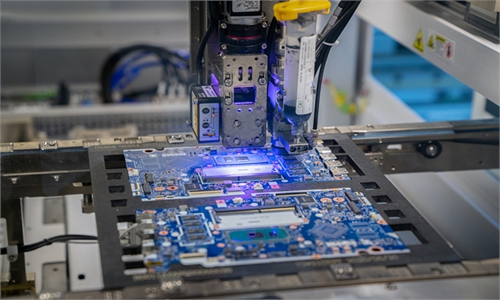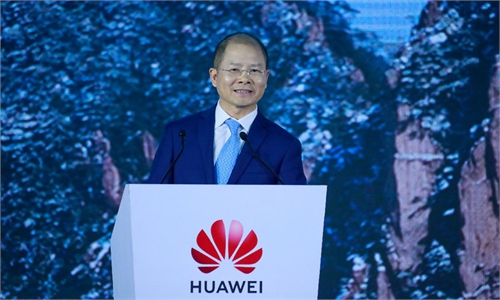COMMENTS / EXPERT ASSESSMENT
US obsession to impede China’s technology advance is broken

Illustration: Tang Tengfei/Global Times
During a visit to the US, South Korea's Trade Minister Yeo Han-Koo held a meeting with US Trade Representative Katherine Tai on Monday. The two "emphasized the importance of working closely together to strengthen supply chain resiliency, including in the area of semiconductors," read a statement issued by the Office of the US Trade Representative.Under the Biden administration's agenda to form small cliques to block China's development in the semiconductor industry in order to maintain its tech hegemony, it is not unexpected for the topic to be raised up again.
From pressing top global semiconductor producers to ramp up investment in the US, to recently hindering a Chinese firm's acquisition of a Korean chip company, the Biden administration has spared no effort to manipulate the chip industrial chain, despite having little to show for their persistence.
Semiconductor is a global sector characterized by a highly refined international division of labor, in which China is now the largest market. In 2020, China imported $350 billion worth of semiconductor chips, accounting for nearly 80 percent of global output, according to reports.
Stripping away the Chinese market would be devastating for global chip producers, including all players from across the value chain. Taking the South Korea-based Samsung for instance, it has deeply integrated into China's development over the past three decades, from sales, production to research and development (R&D).
Not to mention that within Washington's small clique of allies, chip players from different countries and regions are clearly facing a conflict of interest, such as firms from South Korea and Japan. It will not be an easy task for the Biden administration to get all interested parties on the same page.
Following the US' obstruction and manipulation, the industry is facing greater degrees of uncertainty and everyone will need a contingency plan to withstand sudden external interferences, and American firms are no exception.
In fact, with Washington bent on disrupting the chip supply chain, American firms, which account for large chunks of profits within the industrial chain, are bearing the larger proportion of losses.
From a historical perspective, China has been facing external blockage along its way to pursue own technology advancement. However, though cutting-edge high techs always appear hard to get breakthroughs, they have been achieved eventually. The development of technology mainly depends on capital, talent and market, which China owns.
However, with sky-rocketing national debt, years of efforts elbowing out foreign talent, and a market quickly running out of steam, the US has lost strengthen and confidence to keep making scientific and technical revolutions. The US era of tech dominance has passed its peak, and nobody would be surprised if it's all downhill from here.
By contrast, tech developers from China and many developing countries have been catching up in research funding. The world's leading 5G developer Huawei Technologies invested 141.9 billion yuan ($22 billion) in R&D in 2020, with 53.4 percent of all its employees in R&D positions, let alone the unrivalled Chinese market which has been incubating new tech innovations.
The article was compiled based on an interview with Ma Jihua, a veteran industry analyst. bizopinion@globaltimes.com.cn



